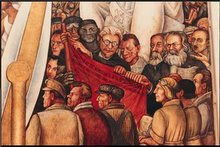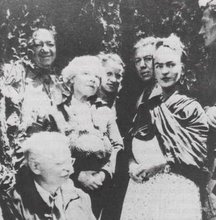WHY THE WORKERS MOVEMENT MUST OPPOSE A CONCERTED RULING CLASS ASSAULT ON THE LABOUR PARTY.
What is unfolding in the Labour Party is that Social Democracy and the Trade Union movement is beginning to gain more influence within this party. It is taken distorted forms and is not clearly visible. Using the Marxist method of Uneven and combined development developed by Trotsky and utilising a Dialectical Materialist analysis of analysing Labour’s internal contradictions, it is possible to see that this process could be accelerated by a hysterical ruling class using the whip hand of reaction.
The Blairites made serious inroads in Bourgeoisfying the Labour Party.
When Trotsky developed the methodological tool of Uneven and combined development he meant that reaction can make inroads depending on a number of objective and subjective factors; but at the same time not all the workers gains are not destroyed until that process is completed. For a party like Labour to become completely Bourgeois and Workers’ States like Eastern Europe and Russia to become Capitalist states requires a massive qualitative break of an explosive character. In the former case it would need a decisive rupture between Bourgeois elements and those who support the Social Democratic Bureaucracy. For Workers’ States to become Capitalist States Trotsky argued would necessitate a civil war.
There have been partial changes in Labour which are fundamental on one level with the reduction of democracy. At the same time for a whole number of historical factors there has not been a decisive rupture for a change in Labour’s class character. This complexity can only be understood by the dialectical interplay of these major forces:-partial/fundamental; accident/necessity; and general/particular. Even if you apply the law of identity in formal logic those Ultra-lefts who define Social Democracy as Bourgeois which the Committee for a Workers International (CWI) does and most workers’ states violate this scientific law. The law of identity means seeing clear differences between different phenomena
In Russia like there has been a decisive move away from Capitalist restoration. The regime is becoming more apparently Stalinist every day. In the Labour Party there is a beginning of a reversal of Blarism with Social Democracy having more influence. This is why you have this hysterical and concerted ruling class campaign against the Labour Party even with its extreme right wing leadership because they fear with the new balance of forces that Brown maybe forced to make additional concessions to the workers. This they do not want to hand out unless they are threatened by revolutionary upheavals because of Capitalism being potentially in its worse crisis.
One of Trotsky’s greatest contributions alongside Rosa Luxemburg and Lenin to Marxism was their theory of Workers Bureaucracy with their dual character. The Trade Union Bureaucrats in the last analysis defends Capitalism because their privileges rest on mediating between Capital and Labour. If a healthy workers’ state comes out of a victorious Socialist Revolution their special privileges would be abolished. This is not to say there would not be Bureaucratic deformations but they would be reduced. At the same Trade Union Bureaucrats sometimes have to mobilise workers to stop Capitalist encroachments on their privileges and come under pressure to defend workers due to fear the rank-and-file will remove their leadership.
Social Democracy carries out on the political level that the Trade Union Bureaucrats do in the economy/workplace of mediating between the classes, sometimes making concessions to workers in order to control them for Capital. This gives them the bargainship that they control millions of workers when they negotiate with the ruling class. This is why British Socialist Worker is wrong in this week’s paper to compare the French Social Democrats with New Labour. New Labour was a Bourgeois faction which attempted to “liberate” themselves from any workers pressure in order to reduce their wages and conditions. In France that kind of faction has not the same weight as it had in the British Labour Party.
That Bourgeois faction was unique to Britain and Italy but did not complete its process of Bourgeoisifcation in Britain. This is why it is methodologically wrong to define Labour as completely New Labour. As a Trotskyist I have no difference with the British SWP about French Social Democracy’s treachery in these strikes but I define them scientifically. During this year’s Presidential elections they proposed massive reforms which gave them a high workers and deprived youth vote. If the French ruling class fears a pre-revolutionary crisis they may use them to contain a growing radicalisation with reforms. To fight this counter-revolutionary leadership it is necessary to understand their dual character and know how to win their mass base over.
The ideological crisis of the workers movement partly influenced by the Soviet Union’s break-up combined with what Mandel defined as “creditability of Socialism” project due to Social Democratic and Stalinist betrayals helped the rise of Blairism. This combined with the workers losing strikes during the 1980s gave the pretext and ideological rationale for supporting right wing leaders within Labour. This is where the law of Uneven and combined development comes in. Trade Union Bureaucrats could not support a complete Bourgeoisifcation because their political role would be carved out and would be no use in utilising the Labour Party to defuse potential rebellions. They were prepared to support a move to the right as long has there was a Social Democratic fig-leaf. Blairism needed the Trade Union Bureaucracy to take as far their Bourgeoisifcation project and to win the 1997 general election. The Trade Union Bureaucracy in return cold control their rank-and-file base in return by making promises of what a Labour government would do for them.
The landslide for Labour in 1997 was a major blow to the Bourgeoisifcation process as it undercut a key mechanism of a coalition government with the Lib Dems. This strengthened the Social Democratic wing and slowed the Blairite assault on workers and the oppressed. They attempted to take their offensive as far as possible by cutting benefits for single parents; cuts for disabled people; attack democratic rights; and to massively develop PFI. This was resisted by elements of Social Democracy who forced the Blairites to rescind the single parent cuts and made treacherous concessions by allowing some cut backs on disabled people in return for concessions on other Blairite excesses. There were Labour MPs during 1999 in double figures opposed any cutbacks on disabled people. In Labour’s first term this Social Democratic opposition and other concessions such as the minimum wage and legislation making it easier to organise union stopped mass upheavals.
During the second and third term Blairism steeped up its attacks and made fewer concessions to workers. This led to strikes and increased demonstrations. One important struggle was the fire-fighters strike of 2002-03 which had mass support of workers and sizeable middle class layers. The government had to make concessions to local government workers after a successful one day strike in July 2002. There was a massive battle by Social Democratic MPs against University top-up fees. This led to a knife-edge parliamentary vote where Blair only got a majority in single numbers. What finished Blair was the disastrous Iraq war. This meant he only survived by the ruling class seeing him as useful. This is why he attempted to introduce massive cuts in the NHS and to lay the basis for its privatisation, and to privatise Secondary schools from 2005 to his downfall.
The Labour Party is at the crossroads. This is what the Ultra-Lefts do not understand. Brown is trying to carry on Blairism with public sector wage cuts and to cut further single parent and disabled benefits. Due to Social Democratic pressures he had to slow down City Academies and withdraw some private contracts for the NHS. This is what is making the ruling class furious as they want a major assault on workers due to their declining profit rates.
The ruling class are divided due to differences over the EU whether there should be a coalition government between Brown and the Lib Dems or whether there should be a Tory government. Liberal Bourgeois elements are trying to soften Brown up to launch further attacks on workers. They may be overplaying their hand with them pushing Brown more into the Social Democratic camp. Trotskyists should have a dual approach to this funding scandal. We call on Labour to not have to any further donations from Capitalists and attack the Brownite concessions to big business but oppose the Capitalist state intervening in the Labour Party. The state’s class character should be exposed. This crisis in Labour gives Trotskyists a chance to intervene in a Transitional manner by calling for the Social Democrats to fight for socialist policies. Through this process we can show why a Socialist Revolution is necessary to guarantee workers gains.
Wednesday, 28 November 2007
Subscribe to:
Post Comments (Atom)



No comments:
Post a Comment